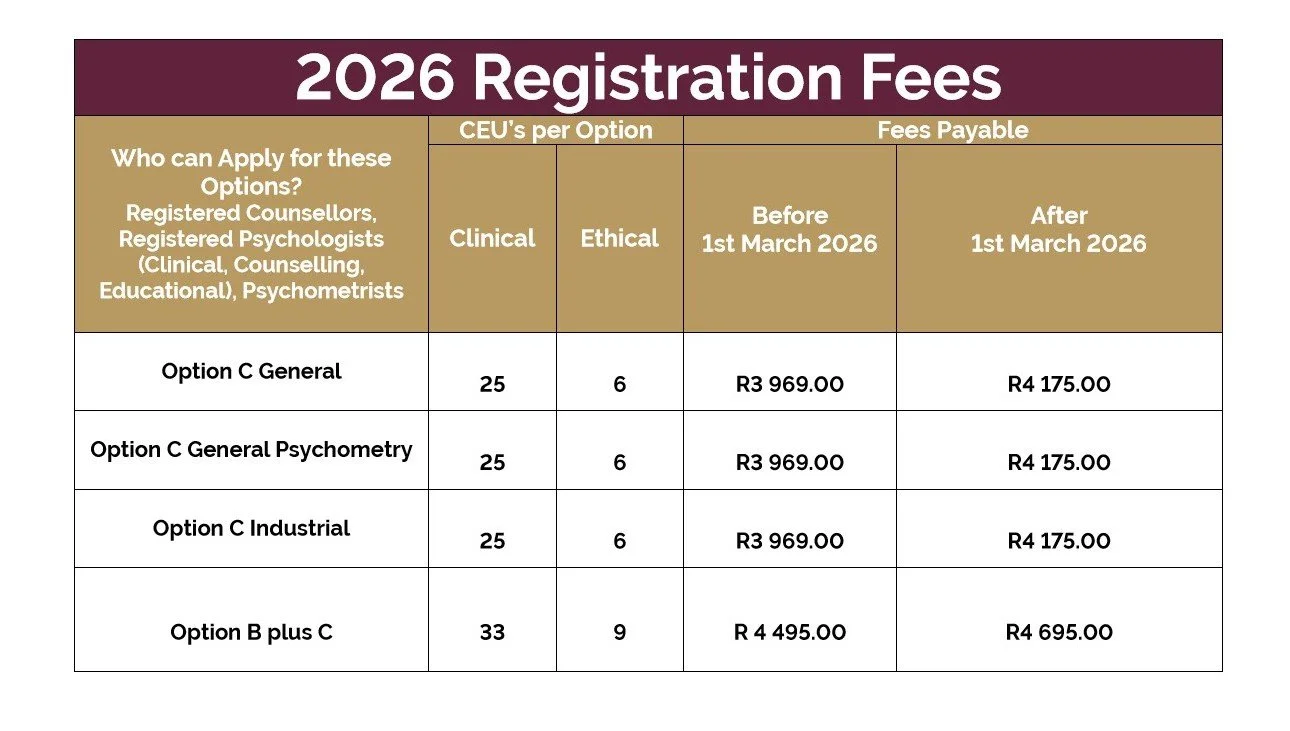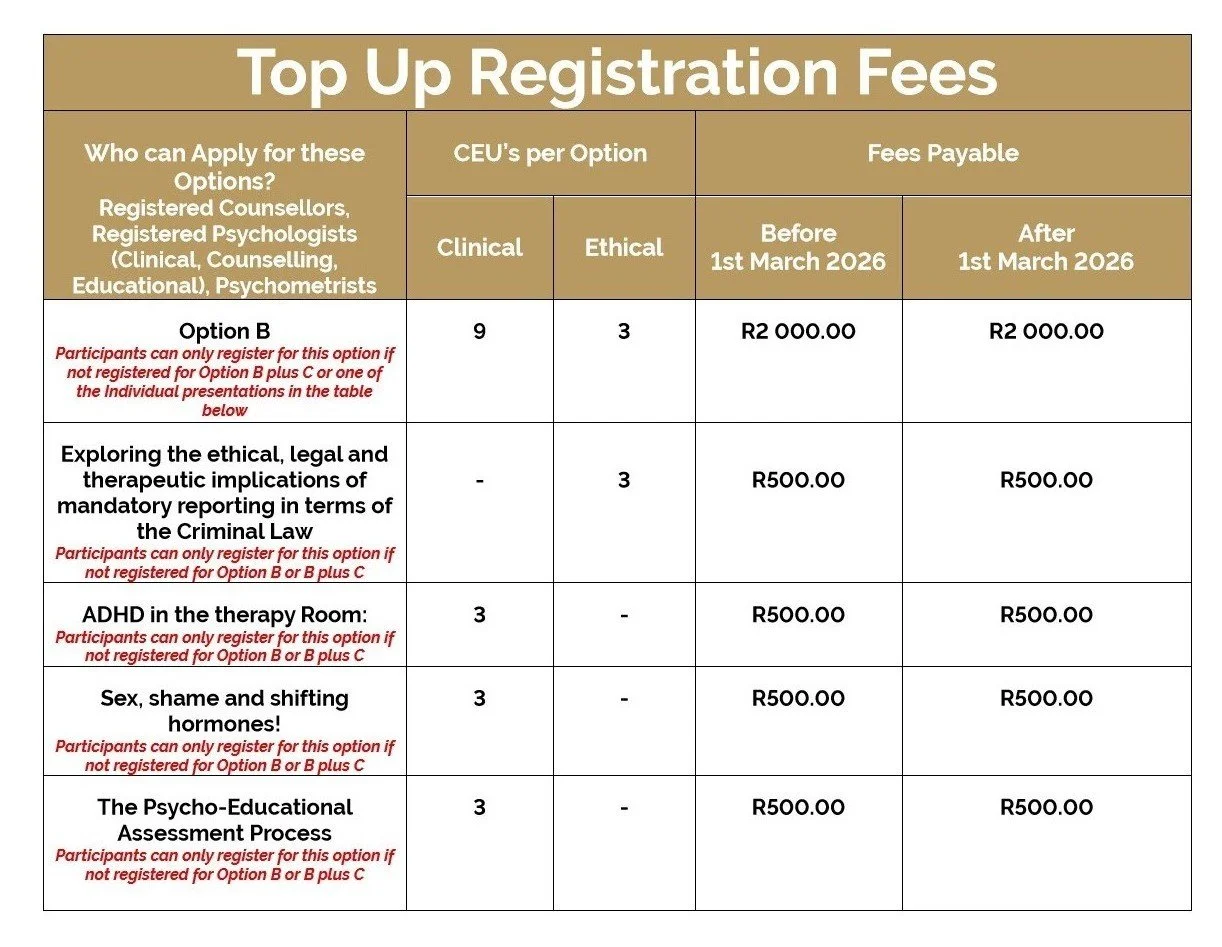One-year continuing professional development programme for psychologists, psychometrists and counsellors
Psychology CPD WELL
2026 Accredited CPD service provider
How our programme works
Timeline
Our 2026 Programme offerings
Option C General
(click on the link above to register)
Study One PowerPoint presentation and Ten articles covering various topics like career counseling, psychotherapy, psychopathology, ethics, and learning disorders. Course materials will be available on SunOnline, along with questionnaires. Participants must score at least 70% on each questionnaire to earn 3 CEUs. A maximum of 31 CEUs (25 Clinical and 6 Ethical) can be earned through this option.
Option C Industrial Psychology
(click on the link above to register)
Study One PowerPoint presentation and Ten articles covering various topics like career counseling, psychotherapy, psychopathology, ethics, and learning disorders. Course materials will be available on SunOnline, along with questionnaires. Participants must score at least 70% on each questionnaire to earn 3 CEUs. A maximum of 31 CEUs (25 Clinical and 6 Ethical) can be earned through this option. ***This option is specifically aimed at the HPCSA registration category for Industrial Psychology***
Option C General Psychometry
(click on the link above to register)
Study One PowerPoint presentation and Ten articles covering various topics like career counseling, psychotherapy, psychopathology, ethics, and learning disorders. Course materials will be available on SunOnline, along with questionnaires. Participants must score at least 70% on each questionnaire to earn 3 CEUs. A maximum of 31 CEUs (25 Clinical and 6 Ethical) can be earned through this option. ***This option is specifically aimed at the HPCSA registration category for Psychometrists***
Option B Plus C (combination)
(click on the link above to register)
Presentations from Five well-known professionals in their respective fields on topics that includes:
Dr Francois van den Berg and Mrs Karen van den Berg presents:
“Exploring the ethical, legal and therapeutic implications of mandatory reporting in terms of the Criminal Law (Sexual Offences and Related Matters) Amendment Act13 of 2021)
The Criminal Law (Sexual Offences and Related Matters) Amendment Act 13 of 2021 introduces significant changes to the mandatory reporting framework for sexual offences in South Africa, with particular relevance for health and mental health care practitioners. Sections 40 and 54 of the Act expand the scope of mandatory reporting obligations, requiring certain professionals to report knowledge or reasonable suspicion of sexual offences to the South African Police Service. These provisions aim to strengthen the protection of survivors and enhance accountability, but they also introduce complex ethical, legal, and therapeutic challenges.
*****
Ms Lelani Cloete
ADHD in the therapy room : Turning Neurobiology into daily relief
ADHD is widely recognised, yet many mental health professionals still grapple with how to translate diagnostic insight into meaningful, practical support. This presentation deepens understanding of ADHD by highlighting subtle and often-missed clinical signals that can lead to misdiagnosis or delayed identification, particularly in adolescents, students, and adults where symptoms may be masked or compensated for. Core executive functioning and emotional regulation challenges will be unpacked, with a focus on how these difficulties manifest across academic, occupational, and daily life contexts. Practical, neuroscience-informed strategies and “brain hacks” will be shared to boost motivation, scaffold routines, and reduce functional impairment. The session will also briefly explore how diagnostic tools and emerging AI technologies can be used to enhance the practitioner’s role.
*****
Ms Lynn Kerchhoff presents
Sex, shame and shifting hormones! A therapeutic response to midlife transitions!
TIn South Africa, over 5 million women aged 40–54 face the transition from perimenopause to menopause, yet many lack access to accurate information or supportive care. As health care practitioners we are uniquely positioned to address the emotional and cognitive challenges associated with perimenopause, including mood instability, anxiety, body image concerns, and relationship dynamics.
This presentation will highlight the critical role of health care practitioners in delivering interventions that are empathetic, evidence-based, and culturally responsive. We will explore how through integrating psychological support into health care practices, we can assist women to improve sexual well-being, reduce stigma, and empower South African women during this critical transition
Ms Mariaan Prins presents:
The Psycho - Educational assessment process
Psycho-educational assessments play a critical role in understanding learners’ educational needs, as well as their strengths and areas of growth. The assessment results, alongside the information obtained from the assessment process (such as observations and collateral information) should ideally contribute to effective educational support. This presentation will explore the assessment process from a psychologist’s perspective, focusing on practical strategies and considerations when working with learners and the relevant role-players. Key areas of discussion will include the rationale for assessing learners, the intake interview as the starting point, the use of collateral information, and report-writing best practices based on the presenter’s experience. Furthermore, the presentation will discuss the importance of feedback in fostering collaboration with parents and educators, as well as the significance of providing learners with feedback on the recommendations. The presenter aims to discuss recommendations following a psycho-educational assessment, taking into account both the learner’s right to equal education and the potential emotional and developmental impact. Finally, participants will gain insights into the process of applying for concessions across different school settings and curricula, supported by the presenter’s real-world experiences and professional reflections. This presentation is designed to equip psychologists and other professionals involved in psycho-educational assessments with practical knowledge to conduct meaningful assessments and provide recommendations that support learners’ educational and emotional development.
*****
Option C
Participants can choose to complete either Ten articles from Option C General or Option C Industrial or Option C General Psychometry
The articles cover various topics like career counseling, psychotherapy, psychopathology, ethics, and learning disorders. Course materials will be available on SunOnline, along with questionnaires. Participants must score at least 70% on each questionnaire to earn 3 CEUs. A maximum of 42 CEUs (33 Clinical and 9 Ethical) can be earned through the combination of Option B plus C
Top-Up registration Options
Option B
**You can only register for this option if you are not registered for Option B plus C or the Individual presentations***
click on the link above to register
Presentations from Five well-known professionals in their respective fields on various topics. as described above.. (3 Ethical and 9 Clinical CEUs)
Individual Presentations
***You can only register for these options if you are not registered for Option B plus C or Option B***
Click on the Heading of your choice to register
ADHD in the therapy room : Turning Neurobiology into daily relief. (3 Clinical CEUs)
Sex, shame and shifting hormones! A therapeutic response to midlife transitions! (3 Clinical CEUs)
The Psycho - Educational Process (3 Clinical CEUs)



